
Post-Op Follow-Up Schedule That Prevents Prosthetic Delays (For Clinicians)
For many clinicians, the surgery is only the first step. What happens after the operation

Losing a limb is more than just a physical change. It changes how you move, how you live, and very often, how you feel inside. The body heals over time, but the mind takes its own path. This path can feel lonely, confusing, and heavy. The emotions that come with amputation are often strong, sometimes silent, and usually hard to explain.
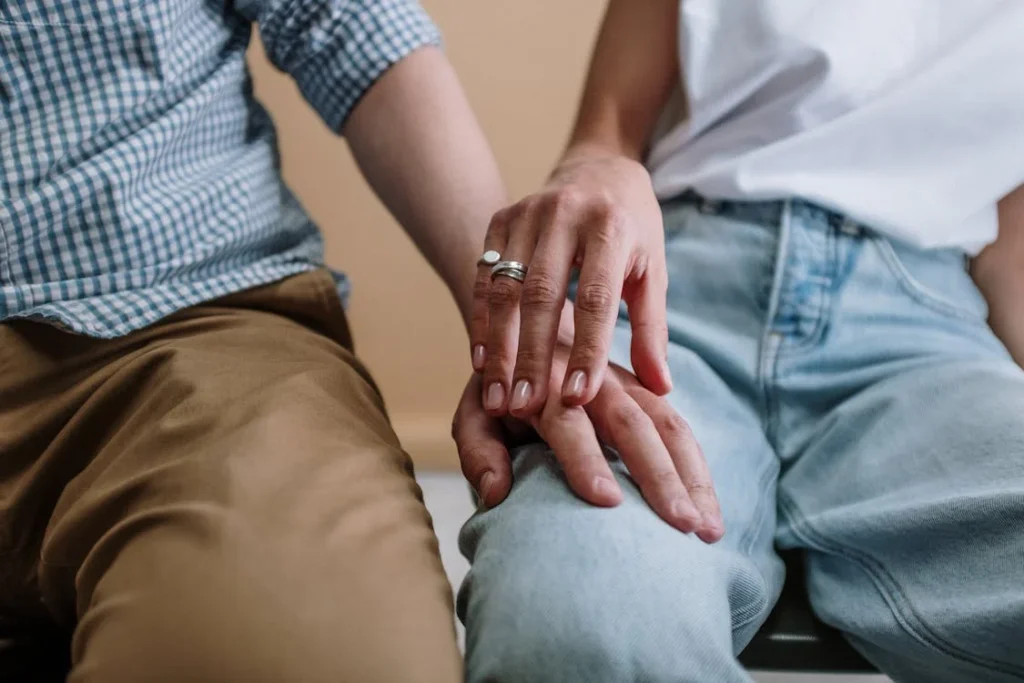
After an amputation, grief usually comes quietly. It’s not always dramatic. You may not even notice it at first. But it’s there, like a storm gathering in the distance. Grief after limb loss is natural.
You’ve lost something important—something that was a part of your body, your movement, your identity. Grieving that loss is not only normal, it’s necessary.
This kind of grief isn’t just about mourning the limb itself. It’s deeper. You’re grieving the way things used to be.
You might miss being able to run, cook, or hug someone the way you used to. You might grieve your independence, or the way people looked at you before.
This grief shows up in moments. Like when you reach out and realize your arm isn’t there. Or when you dream that you’re walking, and wake up to a different reality.
It can come out as tears, silence, or even anger. Sometimes it’s just a hollow feeling in your chest that you can’t put into words.
You may think you have to be strong and hide this grief. But that only makes it harder. Grief needs space. It needs to be felt. And feeling it doesn’t make you weak—it makes you human.
Grief has no fixed timeline. It may last weeks, months, or even longer. But it doesn’t mean you’re stuck. The way through grief is to let it move, not to push it down.
You don’t need to “get over it.” You simply need to allow yourself to process it, at your pace. That could mean talking to someone. Or writing down what you feel. Or sitting quietly with those feelings and acknowledging them.
Let yourself miss what you lost. Let yourself be sad. Then slowly, when you’re ready, let yourself begin to accept that life is changing—but it is not over. You’re still here. And your story still matters.
After an amputation, many people experience a kind of emotional numbness or sadness that doesn’t go away easily. You may feel like everything is dull.
Food doesn’t taste the same. Laughter feels far away. You may sleep too much or barely sleep at all. You might find it hard to care about things that used to matter.
This is not just “feeling down.” It might be depression. And if it is, it’s not your fault.
Amputation brings a massive change to your body and your life. It interrupts your sense of control. Suddenly, everyday things feel harder or even impossible.
You may feel like you’ve lost your freedom. You may feel like you’ve lost who you are.
That’s a heavy load for any mind to carry. And when you don’t have the words to explain it, it turns inward and becomes depression.
Sometimes depression after amputation is also linked to pain—especially phantom pain. The body hurts. The brain gets tired.
Everything starts to feel like too much. People may not see it on the outside. But inside, you’re fighting a quiet battle every day.
If you’re constantly feeling low, hopeless, or disconnected from life, it’s important to take that seriously. Depression after amputation is very common—but that doesn’t mean it should be ignored.
Talking to a therapist can help more than most people realize. You don’t need to have all the right words. A good therapist knows how to meet you where you are.
If therapy feels out of reach, even speaking with a trusted friend, family member, or support group can make a difference.
Small routines also help. A short walk outside. Drinking water. Listening to music that lifts you. Reconnecting with something you used to love, even if only for five minutes.
These don’t fix depression—but they create light in dark corners.
And remember: asking for help doesn’t mean you’re broken. It means you’re brave enough to want better.
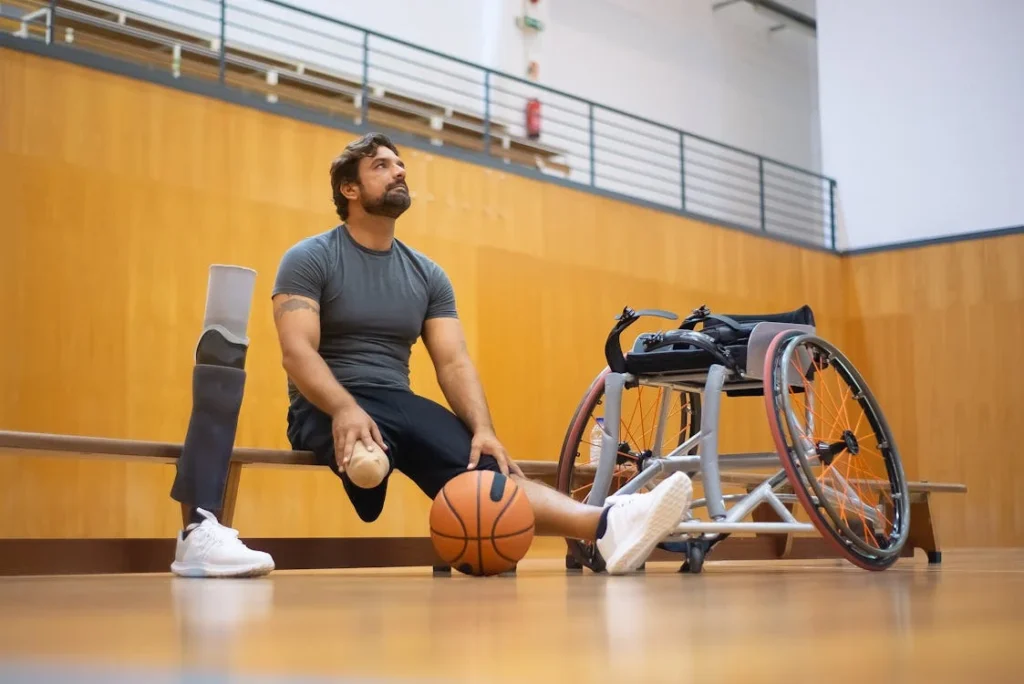
For many amputees, fear becomes a constant background noise. You may worry about falling in public, or what people will think when they see your prosthetic.
You might panic about leaving the house, or dread going back to work. You may lie awake wondering what your future will look like.
That’s anxiety. And it often follows amputation like a shadow.
Your brain wants to protect you. After trauma—like an accident or surgery—it becomes alert. It starts scanning for danger. It tells you to watch out. It makes you imagine worst-case scenarios, even when things are okay.
That’s your brain doing its job. But after a while, it forgets how to turn that alarm off.
This fear gets stronger when you feel out of control. After losing a limb, many daily things suddenly feel unfamiliar. You may not trust your body. You may not trust the world around you. That creates anxiety.
It shows up in physical ways—shaking hands, tight chest, fast heartbeat. Or emotional ways—constant worry, restlessness, panic.
First, breathe. Anxiety takes you out of the present moment. A few slow, deep breaths can ground you. It won’t erase the fear, but it can quiet the noise for a while.
Second, talk about it. Anxiety grows in silence. But when you say it out loud, it shrinks. Share your worries with someone who listens without judgment.
Third, create small goals. Facing your fears all at once can feel impossible. But facing them in steps—taking a short trip outside, attending a social event for a few minutes, trying a new task at home—helps build confidence again.
Most importantly, remind yourself: your fear is valid, but it doesn’t control you. You’ve survived a major event. You’re stronger than you feel.
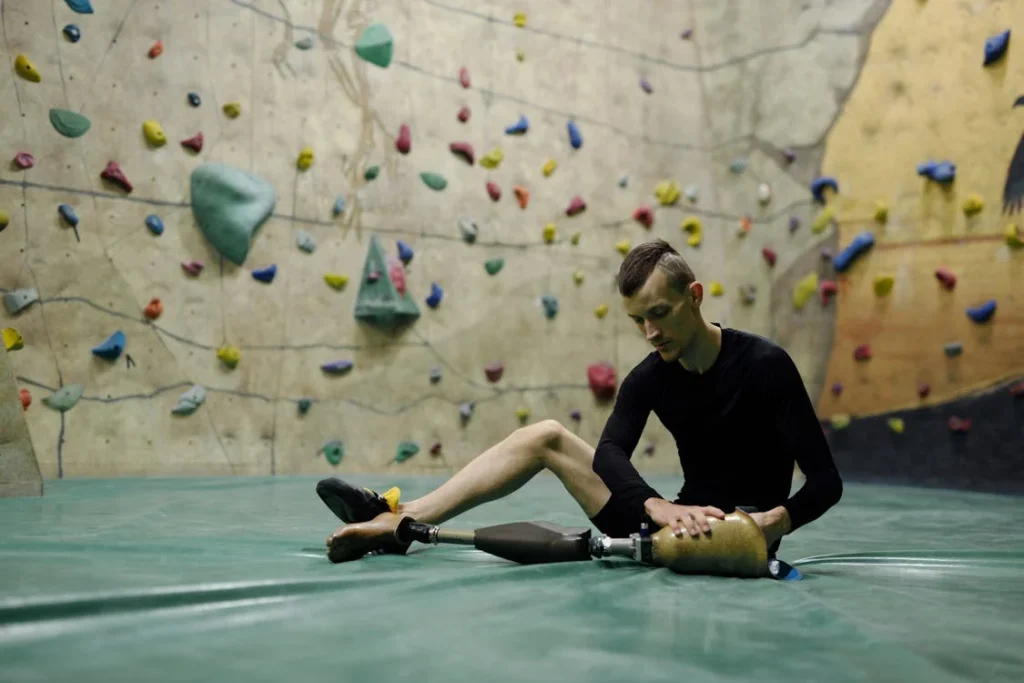
One of the most personal and painful effects of amputation is how it changes the way you see your own body. When you lose a limb, the mirror becomes something unfamiliar.
The reflection staring back doesn’t match who you used to be. This can lead to discomfort, embarrassment, even shame. It can shake your confidence and make you want to hide.
These feelings are real. And they are more common than you think.
You may have spent years, even decades, getting used to your body. And now, suddenly, it’s different. Your body doesn’t move the same. It doesn’t look the same. And the world may not look at it the same way either.
This can feel like losing more than just a limb. It can feel like losing your identity. You may struggle to accept your reflection.
You may feel awkward in public, or even around your partner. Intimacy might become uncomfortable—not just physically, but emotionally. You may ask yourself, “Will anyone find me attractive again?”
This is not about vanity. It’s about self-worth. It’s about feeling human, whole, and seen.
Healing your relationship with your body takes time. You don’t need to force acceptance. Start small. If mirrors feel overwhelming, avoid them until you’re ready.
If dressing feels hard, find clothes that make you feel good, even in the smallest way.
Some people find strength in learning about their prosthetic, understanding how it works, and even customizing it.
Others begin to feel confident by slowly returning to the things they used to love—whether it’s going for a walk, playing music, or meeting a friend for tea.
It’s okay to feel uncomfortable. It’s okay to feel unsure. But don’t stay silent. Talking about body image issues with a therapist or support group can help you unpack the deep emotions behind those feelings.
You are not defined by your limb loss. You are defined by how you carry yourself in its wake—with courage, honesty, and care.
One of the hardest things about amputation is how lonely it can feel—even when you’re surrounded by people. You may have family, friends, and doctors around you.
But still, there’s a part of your experience that feels invisible. Like no one truly gets it. That loneliness can creep in slowly, or it can hit you all at once.
And it hurts. Because human beings need connection, especially in hard times.
After losing a limb, your world often shrinks. You may stay home more. Social events may feel exhausting or embarrassing.
You might avoid old friends because you don’t want to answer questions—or worse, deal with their silence. Even loved ones with good intentions may not know how to talk to you anymore. Conversations change. Some people drift away.
This creates a quiet but painful gap. You might smile and say you’re fine. But inside, you may feel like no one sees what you’re really going through.
Isolation also feeds other emotions—sadness, anger, fear. When you have no one to talk to, these feelings build up. They can become overwhelming.
The first step in breaking isolation is being honest—with yourself and with at least one other person. You don’t need to tell your full story right away. But opening up a little can be the start of something bigger.
Reach out to people you trust. Tell them you’re struggling. Let them sit with you in silence if that’s all you need. Sometimes, just having someone there—even without words—is healing.
Support groups, both in-person and online, can also be powerful. Talking to others who have been through amputation creates a kind of connection that’s hard to find elsewhere.
These spaces remind you: You’re not the only one. And you don’t have to go through this alone.
Volunteering or helping others can also ease isolation. It reconnects you to purpose and gives you a reason to step outside your pain, even if only for a while.
Little by little, you’ll begin to feel like you belong again. And that’s one of the most powerful forms of healing there is.
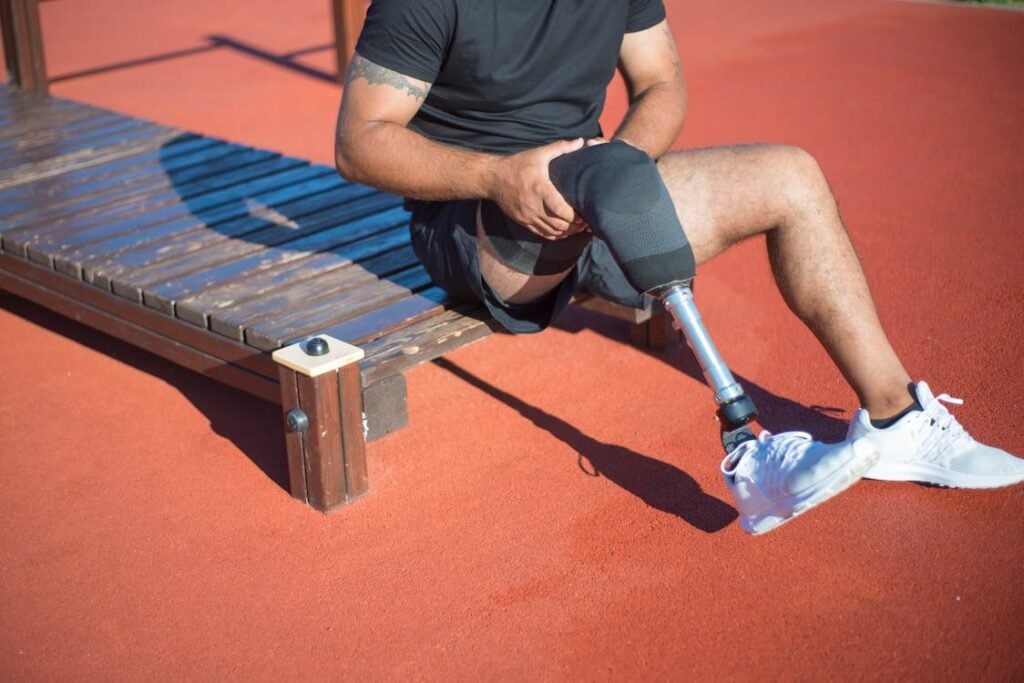
After an amputation, there’s often a storm inside—a mix of questions, emotions, and deep, raw anger. This anger isn’t just about the loss itself. It’s about everything that came with it. The sudden changes. The limitations.
The way people treat you differently. The dreams that feel far away now. The life that was moving one way, and suddenly stopped.
Feeling angry doesn’t make you ungrateful or negative. It makes you honest. And it’s something many amputees feel but are afraid to say out loud.
Anger can come out in small ways. You might snap at someone you love. You might avoid conversations.
You might feel annoyed at things that never used to bother you. Sometimes, anger stays inside—quiet, simmering, and heavy.
You might feel angry at the people who caused your accident. Or at your own body for failing you. Or at the doctors who didn’t explain things clearly. Or just at the world for being so unfair.
This anger is valid. It’s not something to hide or be ashamed of. But if left unchecked, it can start to poison your thoughts and relationships.
The first step is to allow the anger to exist without trying to shut it down. You can say, “Yes, I’m angry.” You don’t need to justify it. You don’t need to explain it away.
Anger, when held gently, can teach you something. It tells you what mattered to you. What you’ve lost. What you need.
Find safe ways to let it out. Talk to someone who won’t judge you. Write it down. Scream into a pillow if you have to. Don’t pretend it’s not there.
Then, when the heat softens, ask yourself: What is this anger protecting? What’s underneath it? Often, you’ll find sadness. Hurt. Fear. When you begin to see those softer parts, healing becomes possible.
Over time, the anger can change. It can become fuel. It can drive you to fight for your recovery. To demand better care. To rebuild your life on your own terms. You can’t erase what happened—but you can choose what you do with it.
Perhaps one of the deepest wounds after amputation is the one you can’t see. It’s the question that keeps coming up in quiet moments: Who am I now?
You used to be someone who could walk, run, climb stairs, play a sport, dance, carry groceries, hold your child without hesitation.
And now? You might feel like a different person altogether. This shift can be disorienting. It can feel like you’re floating without an anchor.
After losing a limb, many people feel like they’ve lost more than just a part of their body. They’ve lost a part of their identity.
You may no longer recognize yourself in the mirror. You may not know how to introduce yourself to new people. You may feel like your old life belongs to someone else.
It’s not just about what you can or can’t do physically. It’s about the emotional weight of change.
If your career involved movement, if your passions involved performance, or if your confidence came from how you carried yourself—this loss can shake everything.
You might even feel guilt for not feeling “like yourself.” But identity is not fixed. It’s something we rebuild many times throughout life.
You don’t need to rush back into being “your old self.” In fact, you don’t need to be that person again at all. Instead, allow yourself to become someone new—someone shaped by experience, strength, and resilience.
Start by asking yourself what still matters. What parts of you remain unchanged? Maybe it’s your sense of humor. Your love for your family. Your curiosity. Your compassion. These are anchors. Hold onto them.
Then look for small ways to rediscover yourself. Pick up an old hobby. Try a new one. Speak to others who’ve gone through this. Let their stories inspire your own.
You are not lost. You are becoming. And this version of you—this evolving, adapting, learning version—is just as real, just as worthy, and just as strong as the one before.
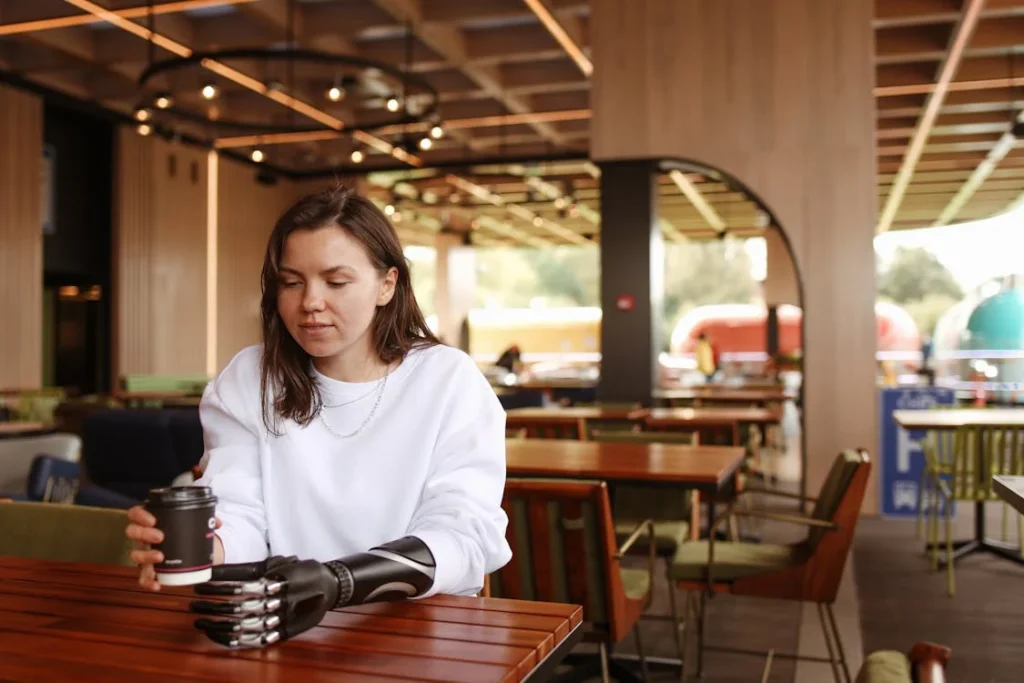
Many amputees quietly carry a hidden weight: guilt. Guilt for needing help. Guilt for not being able to do everything they used to.
Guilt for the extra emotional or physical strain their loved ones might now face. It’s a feeling that slowly builds and often goes unspoken—but it can be just as heavy as grief or pain.
You may look at the people around you and wonder if they’re tired. If they resent helping you. If they’d be better off if things were “normal.” These thoughts, though natural, can start to chip away at your confidence and self-worth.
Our world often celebrates independence. We’re told we should be able to do things on our own, take care of ourselves, not “trouble” others.
So when life shifts and you suddenly need help—getting dressed, moving around, managing tasks—it can make you feel like you’ve failed.
You may compare yourself to who you were before the amputation and feel disappointed. Or you may worry constantly about being a “burden,” even when your loved ones don’t see you that way at all.
This guilt is made worse when you see your partner juggling more responsibilities, or when a parent or friend rearranges their life to support you. The mind turns every act of love into a weight on your heart.
The truth is: needing help does not make you a burden. It makes you human.
Everyone needs help at some point. And the people who love you—who truly care—want to be there. They don’t see you as weak.
They see you as someone they want to walk beside. When you carry guilt, you deny them the chance to love you fully.
Try this: imagine if the roles were reversed. Would you think less of someone you love if they needed your help? Would you feel burdened, or would you want to be there for them?
Let that question sit with you.
The key isn’t to never feel guilty—it’s to recognize when guilt is lying to you. Because you are not less worthy of love or care simply because your needs have changed.
Instead of focusing on what you can’t do, start noticing what you still offer. Your presence. Your wisdom. Your courage. Your love. These are not small things. They’re everything.
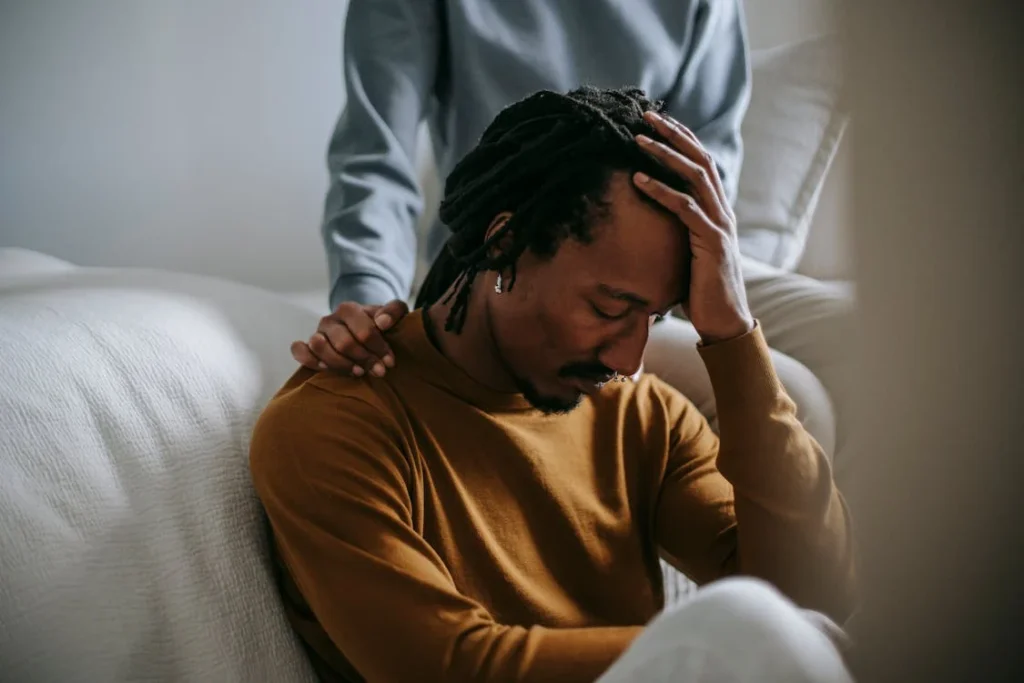
In moments of quiet, or even in the middle of a busy day, your mind may whisper a bitter question: “Why did this happen to me?”
You may look around and see people walking easily, living pain-free, moving through the world without hesitation. And that part of you, still aching and healing, may feel something sharp—resentment.
Resentment isn’t something we like to admit. But it’s a normal reaction to loss. When life takes something precious from you, it’s only natural to feel hurt by the world around you.
After amputation, you may catch yourself comparing everything—your body, your pace, your energy, even your happiness—to others.
Whether it’s friends, strangers, or your old self from the past, these comparisons can become constant.
This comparison often leads to pain. Because no matter what, you come up short. You start thinking that your life is now “less than.” And over time, this thought becomes a quiet poison.
The truth is, everyone is carrying something. What you see on the surface is never the whole story.
The person who walks with ease may be fighting their own invisible battles. But even if they’re not—that doesn’t make your pain less valid.
You may not be able to control what happened to you. But you can decide how to move through it. That doesn’t mean pretending to be okay when you’re not. It means refusing to let bitterness close your heart.
Start by acknowledging your resentment without judging it. Say it to yourself:
“Yes, I feel angry that others don’t have to deal with this.”
That’s honesty. Then ask:
“What can I do with that feeling?”
You might use it to advocate for better access, better care, better understanding. Or you might use it as a reason to appreciate your own growth more deeply.
Your journey doesn’t need to look like anyone else’s. You don’t need to match someone’s timeline or ability. You are allowed to be exactly where you are, and still be moving forward.
Letting go of comparison isn’t a one-time choice. It’s something you’ll practice again and again. But every time you catch yourself and come back to your story, you take a step closer to peace.
Somewhere along the road—maybe weeks, maybe months, maybe years after your amputation—you may notice a new feeling starting to grow. At first, it might feel unfamiliar or even fragile. But it’s there. A tiny spark. Hope.
This is the part of the journey many people don’t talk about enough. Because after so much pain, fear, and anger, it can be hard to trust good feelings again.
But the truth is, emotional healing doesn’t mean erasing what happened. It means learning how to live with it, and still find moments of joy, peace, and purpose.
Hope often shows up quietly. Maybe you wake up and realize you didn’t cry this morning. Maybe you laugh at something your friend says, and the sound feels genuine.
Maybe you try something you haven’t done in a long time—walking outside, cooking your favorite dish, calling an old friend.
These are small victories. But they matter more than you know.
When you start to feel these tiny moments, don’t brush them off. Lean into them. Let yourself enjoy them without guilt. Let them remind you that there is still life to live—not the same life, but one still worth showing up for.
You are not betraying your pain by feeling happy again. You are honoring your strength.
Healing after an amputation doesn’t mean everything goes back to how it was. It doesn’t mean you never have bad days. It doesn’t mean you stop grieving.
It means you’ve learned how to carry your story with you without letting it define everything. You’ve found ways to adapt, to grow, and to make space for both sorrow and joy.
You’ve started living again—not in spite of your amputation, but with it.
Some days you’ll still struggle. That’s normal. But those struggles no longer erase your progress. They are just part of your new, layered, complex life.
Healing means you start to make plans again. You start to dream again. Maybe even help others through what you’ve been through. And slowly, your identity becomes something rooted not in loss, but in meaning.
For many people, amputation becomes a turning point—not just a loss, but a new direction. You may find purpose in helping others. In raising awareness.
In sharing your story. In becoming an advocate. Or simply in being the best version of yourself, every single day.
Pain has a strange way of revealing what really matters. It strips away the noise and shows you what you truly care about. That clarity can be a gift.
So ask yourself: What do I want this next chapter to look like?
You don’t have to have all the answers. But the act of asking is where purpose begins.
Let this be your reminder: You are allowed to move forward. You are allowed to feel good again. You are allowed to create a life full of meaning—even after everything.
The emotional journey after amputation is complex. It’s not just about learning how to walk again or use a prosthetic—it’s about learning how to feel again, trust again, and live again. You may face grief, fear, anger, or isolation. Some days will feel heavier than others. But none of these feelings mean you’re broken. They mean you’re human.
There is no single path to healing. But step by step, through honest conversations, inner reflection, and support, you begin to reclaim your life. You learn that pain and purpose can exist side by side. You remember that your story didn’t end with your limb loss—it simply changed direction.
At Robobionics, we believe that every person has the strength to rise—not just physically, but emotionally. And if you ever forget that, we’ll be here to remind you.
You are more than what you’ve lost. You are everything you continue to become.

For many clinicians, the surgery is only the first step. What happens after the operation

For trauma amputees, the journey does not begin at the prosthetic clinic. It begins much

Amputation after cancer is not just a surgical event. It is the end of one

When a child loses a limb, the challenge is never only physical. A child’s body
Last updated: November 10, 2022
Thank you for shopping at Robo Bionics.
If, for any reason, You are not completely satisfied with a purchase We invite You to review our policy on refunds and returns.
The following terms are applicable for any products that You purchased with Us.
The words of which the initial letter is capitalized have meanings defined under the following conditions. The following definitions shall have the same meaning regardless of whether they appear in singular or in plural.
For the purposes of this Return and Refund Policy:
Company (referred to as either “the Company”, “Robo Bionics”, “We”, “Us” or “Our” in this Agreement) refers to Bionic Hope Private Limited, Pearl Haven, 1st Floor Kumbharwada, Manickpur Near St. Michael’s Church Vasai Road West, Palghar Maharashtra 401202.
Goods refer to the items offered for sale on the Website.
Orders mean a request by You to purchase Goods from Us.
Service refers to the Services Provided like Online Demo and Live Demo.
Website refers to Robo Bionics, accessible from https://robobionics.in
You means the individual accessing or using the Service, or the company, or other legal entity on behalf of which such individual is accessing or using the Service, as applicable.
You are entitled to cancel Your Service Bookings within 7 days without giving any reason for doing so, before completion of Delivery.
The deadline for cancelling a Service Booking is 7 days from the date on which You received the Confirmation of Service.
In order to exercise Your right of cancellation, You must inform Us of your decision by means of a clear statement. You can inform us of your decision by:
We will reimburse You no later than 7 days from the day on which We receive your request for cancellation, if above criteria is met. We will use the same means of payment as You used for the Service Booking, and You will not incur any fees for such reimbursement.
Please note in case you miss a Service Booking or Re-schedule the same we shall only entertain the request once.
In order for the Goods to be eligible for a return, please make sure that:
The following Goods cannot be returned:
We reserve the right to refuse returns of any merchandise that does not meet the above return conditions in our sole discretion.
Only regular priced Goods may be refunded by 50%. Unfortunately, Goods on sale cannot be refunded. This exclusion may not apply to You if it is not permitted by applicable law.
You are responsible for the cost and risk of returning the Goods to Us. You should send the Goods at the following:
We cannot be held responsible for Goods damaged or lost in return shipment. Therefore, We recommend an insured and trackable courier service. We are unable to issue a refund without actual receipt of the Goods or proof of received return delivery.
If you have any questions about our Returns and Refunds Policy, please contact us:
Last Updated on: 1st Jan 2021
These Terms and Conditions (“Terms”) govern Your access to and use of the website, platforms, applications, products and services (ively, the “Services”) offered by Robo Bionics® (a registered trademark of Bionic Hope Private Limited, also used as a trade name), a company incorporated under the Companies Act, 2013, having its Corporate office at Pearl Heaven Bungalow, 1st Floor, Manickpur, Kumbharwada, Vasai Road (West), Palghar – 401202, Maharashtra, India (“Company”, “We”, “Us” or “Our”). By accessing or using the Services, You (each a “User”) agree to be bound by these Terms and all applicable laws and regulations. If You do not agree with any part of these Terms, You must immediately discontinue use of the Services.
1.1 “Individual Consumer” means a natural person aged eighteen (18) years or above who registers to use Our products or Services following evaluation and prescription by a Rehabilitation Council of India (“RCI”)–registered Prosthetist.
1.2 “Entity Consumer” means a corporate organisation, nonprofit entity, CSR sponsor or other registered organisation that sponsors one or more Individual Consumers to use Our products or Services.
1.3 “Clinic” means an RCI-registered Prosthetics and Orthotics centre or Prosthetist that purchases products and Services from Us for fitment to Individual Consumers.
1.4 “Platform” means RehabConnect™, Our online marketplace by which Individual or Entity Consumers connect with Clinics in their chosen locations.
1.5 “Products” means Grippy® Bionic Hand, Grippy® Mech, BrawnBand™, WeightBand™, consumables, accessories and related hardware.
1.6 “Apps” means Our clinician-facing and end-user software applications supporting Product use and data collection.
1.7 “Impact Dashboard™” means the analytics interface provided to CSR, NGO, corporate and hospital sponsors.
1.8 “Services” includes all Products, Apps, the Platform and the Impact Dashboard.
2.1 Individual Consumers must be at least eighteen (18) years old and undergo evaluation and prescription by an RCI-registered Prosthetist prior to purchase or use of any Products or Services.
2.2 Entity Consumers must be duly registered under the laws of India and may sponsor one or more Individual Consumers.
2.3 Clinics must maintain valid RCI registration and comply with all applicable clinical and professional standards.
3.1 Robo Bionics acts solely as an intermediary connecting Users with Clinics via the Platform. We do not endorse or guarantee the quality, legality or outcomes of services rendered by any Clinic. Each Clinic is solely responsible for its professional services and compliance with applicable laws and regulations.
4.1 All content, trademarks, logos, designs and software on Our website, Apps and Platform are the exclusive property of Bionic Hope Private Limited or its licensors.
4.2 Subject to these Terms, We grant You a limited, non-exclusive, non-transferable, revocable license to use the Services for personal, non-commercial purposes.
4.3 You may not reproduce, modify, distribute, decompile, reverse engineer or create derivative works of any portion of the Services without Our prior written consent.
5.1 Limited Warranty. We warrant that Products will be free from workmanship defects under normal use as follows:
(a) Grippy™ Bionic Hand, BrawnBand® and WeightBand®: one (1) year from date of purchase, covering manufacturing defects only.
(b) Chargers and batteries: six (6) months from date of purchase.
(c) Grippy Mech™: three (3) months from date of purchase.
(d) Consumables (e.g., gloves, carry bags): no warranty.
5.2 Custom Sockets. Sockets fabricated by Clinics are covered only by the Clinic’s optional warranty and subject to physiological changes (e.g., stump volume, muscle sensitivity).
5.3 Exclusions. Warranty does not apply to damage caused by misuse, user negligence, unauthorised repairs, Acts of God, or failure to follow the Instruction Manual.
5.4 Claims. To claim warranty, You must register the Product online, provide proof of purchase, and follow the procedures set out in the Warranty Card.
5.5 Disclaimer. To the maximum extent permitted by law, all other warranties, express or implied, including merchantability and fitness for a particular purpose, are disclaimed.
6.1 We collect personal contact details, physiological evaluation data, body measurements, sensor calibration values, device usage statistics and warranty information (“User Data”).
6.2 User Data is stored on secure servers of our third-party service providers and transmitted via encrypted APIs.
6.3 By using the Services, You consent to collection, storage, processing and transfer of User Data within Our internal ecosystem and to third-party service providers for analytics, R&D and support.
6.4 We implement reasonable security measures and comply with the Information Technology Act, 2000, and Information Technology (Reasonable Security Practices and Procedures and Sensitive Personal Data or Information) Rules, 2011.
6.5 A separate Privacy Policy sets out detailed information on data processing, user rights, grievance redressal and cross-border transfers, which forms part of these Terms.
7.1 Pursuant to the Information Technology Rules, 2021, We have given the Charge of Grievance Officer to our QC Head:
- Address: Grievance Officer
- Email: support@robobionics.in
- Phone: +91-8668372127
7.2 All support tickets and grievances must be submitted exclusively via the Robo Bionics Customer Support portal at https://robobionics.freshdesk.com/.
7.3 We will acknowledge receipt of your ticket within twenty-four (24) working hours and endeavour to resolve or provide a substantive response within seventy-two (72) working hours, excluding weekends and public holidays.
8.1 Pricing. Product and Service pricing is as per quotations or purchase orders agreed in writing.
8.2 Payment. We offer (a) 100% advance payment with possible incentives or (b) stage-wise payment plans without incentives.
8.3 Refunds. No refunds, except pro-rata adjustment where an Individual Consumer is medically unfit to proceed or elects to withdraw mid-stage, in which case unused stage fees apply.
9.1 Users must follow instructions provided by RCI-registered professionals and the User Manual.
9.2 Users and Entity Consumers shall indemnify and hold Us harmless from all liabilities, claims, damages and expenses arising from misuse of the Products, failure to follow professional guidance, or violation of these Terms.
10.1 To the extent permitted by law, Our total liability for any claim arising out of or in connection with these Terms or the Services shall not exceed the aggregate amount paid by You to Us in the twelve (12) months preceding the claim.
10.2 We shall not be liable for any indirect, incidental, consequential or punitive damages, including loss of profit, data or goodwill.
11.1 Our Products are classified as “Rehabilitation Aids,” not medical devices for diagnostic purposes.
11.2 Manufactured under ISO 13485:2016 quality management and tested for electrical safety under IEC 60601-1 and IEC 60601-1-2.
11.3 Products shall only be used under prescription and supervision of RCI-registered Prosthetists, Physiotherapists or Occupational Therapists.
We do not host third-party content or hardware. Any third-party services integrated with Our Apps are subject to their own terms and privacy policies.
13.1 All intellectual property rights in the Services and User Data remain with Us or our licensors.
13.2 Users grant Us a perpetual, irrevocable, royalty-free licence to use anonymised usage data for analytics, product improvement and marketing.
14.1 We may amend these Terms at any time. Material changes shall be notified to registered Users at least thirty (30) days prior to the effective date, via email and website notice.
14.2 Continued use of the Services after the effective date constitutes acceptance of the revised Terms.
Neither party shall be liable for delay or failure to perform any obligation under these Terms due to causes beyond its reasonable control, including Acts of God, pandemics, strikes, war, terrorism or government regulations.
16.1 All disputes shall be referred to and finally resolved by arbitration under the Arbitration and Conciliation Act, 1996.
16.2 A sole arbitrator shall be appointed by Bionic Hope Private Limited or, failing agreement within thirty (30) days, by the Mumbai Centre for International Arbitration.
16.3 Seat of arbitration: Mumbai, India.
16.4 Governing law: Laws of India.
16.5 Courts at Mumbai have exclusive jurisdiction over any proceedings to enforce an arbitral award.
17.1 Severability. If any provision is held invalid or unenforceable, the remainder shall remain in full force.
17.2 Waiver. No waiver of any breach shall constitute a waiver of any subsequent breach of the same or any other provision.
17.3 Assignment. You may not assign your rights or obligations without Our prior written consent.
By accessing or using the Products and/or Services of Bionic Hope Private Limited, You acknowledge that You have read, understood and agree to be bound by these Terms and Conditions.